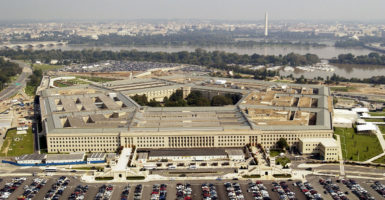The Department of Defense this month partnered with Texas A&M University to co-sponsor Drone Venture Day, the first event of the Pentagon’s new Trusted Capital Marketplace initiative.
The Nov. 13 event brought American manufacturers of unmanned aircraft and counter-unmanned aircraft systems together with trusted capital providers, with the hope that the connections made might lead to potential business partnerships.
A pilot of such a program was mandated by Section 1711 of the 2018 National Defense Authorization Act, “which would be purposed for strengthening manufacturing in the defense industrial base.”
The essential goal of the Trusted Capital Marketplace initiative is to connect American innovators and small businesses in the defense sector with funding from trustworthy sources.
What is a “trustworthy source”? It’s presumably a provider of capital that does not have ties to potential adversaries of the United States, such as China, Russia, or Iran.
The purpose of that is twofold, according to Undersecretary of Defense for Acquisition and Sustainment Ellen Lord; namely, to “limit adversarial foreign access to technology and strengthen domestic manufacturing in the defense industrial base.”
Although many operational details of the program are still unclear, Lord mentioned building a website infrastructure to connect businesses and capital. This marketplace would be available to companies that lack the resources to find trusted capital, but produce innovative defense technologies.
According to Lord, those sources of capital include “individuals, family foundations, [and] funds that are interested in our national defense.” The actual dollar value of the potential capital pool has yet to be determined.
In an increasingly integrated global economy, the Department of Defense has to ensure that its vendors can’t compromise the United States’ national security.
Adversarial foreign access to U.S. companies and tech, most notably these days by China, is a threat to the defense industrial base. Heritage experts have written extensively on the Chinese threat (see here and here).
In the past, the U.S. government has prevented foreign entities from buying American companies or providing services that may put national security at risk. The primary mechanism for doing so is by utilizing the Committee on Foreign Investment in the United States.
According to the U.S. Department of the Treasury, the Committee on Foreign Investment in the United States is “an interagency committee authorized to review certain transactions involving foreign investment in the United States, in order to determine the effect of such transactions on the national security of the United States.”
In 2017, President Donald Trump prevented China Venture Capital Fund Corp. Ltd. from buying the American company Lattice Semiconductor Corp., citing national security concerns.
In 2018, the U.S. semiconductor-testing company Xcerra Corp. also had its sale to a Chinese investment fund blocked by the committee. It was theorized that the deal was tanked because Xcerra is part of the U.S. government’s and military’s supply chain, potentially jeopardizing its security.
Semiconductors are a critical component in electronics, and the administration feared the intellectual property may be hijacked to support the Chinese military.
However, the Committee on Foreign Investment in the United States’ strategy of reviewing acquisitions is inherently reactive in nature and does not address the root of the problem, so the Defense Department developed a more aggressive approach.
That approach involves plans to implement the Trusted Capital Marketplace to quickly secure the military’s supply chain and increase innovation.
Lord said that after assessing the American defense industrial base and supply chain resiliency, the Pentagon looked “down into the fourth, fifth, sixth, seventh layer of our supply chain to understand where we are sole source or where we’re dependent on a foreign entity that might not be a trusted source.”
The new program comes at a time when the U.S. military has been shown to rely on foreign materials and components for defense products—including materials from China.
For example, the Chinese government has dominated the market for rare-earth minerals that are critical in the production of defense products, controlling 80% of the global rare-earth mineral resourcing, making the U.S. reliant on Beijing’s supply—and sensitive to sudden cutoffs.
The Defense Department’s and Texas A&M University’s Drone Venture Day was timely, considering drones and unmanned systems are a sector in which some think China has taken the lead, prompting concerns in the U.S.
The Drone Venture Day is just the first of many planned events that will bring together private-sector innovation with trustworthy sources of capital, allowing American ingenuity to turn the tides back on China.
By forming the Trusted Capital Marketplace, the Defense Department has taken a necessary first step toward ensuring that our defense industrial base is healthy and that our warfighters have the most advanced, trustworthy equipment possible.



























